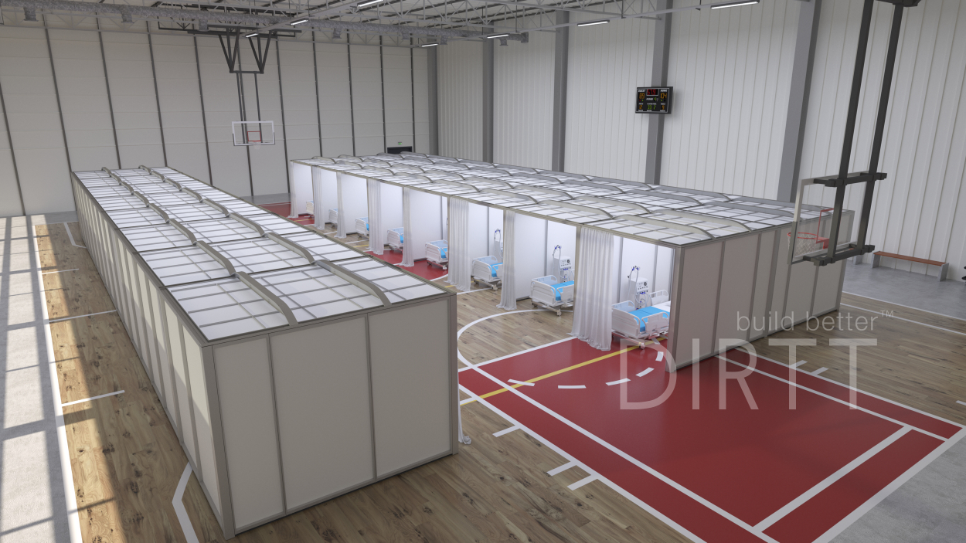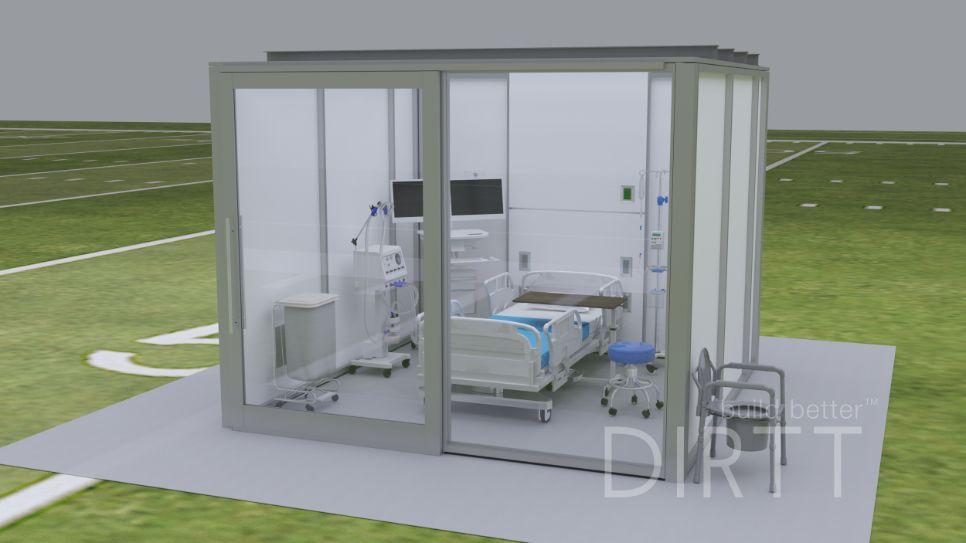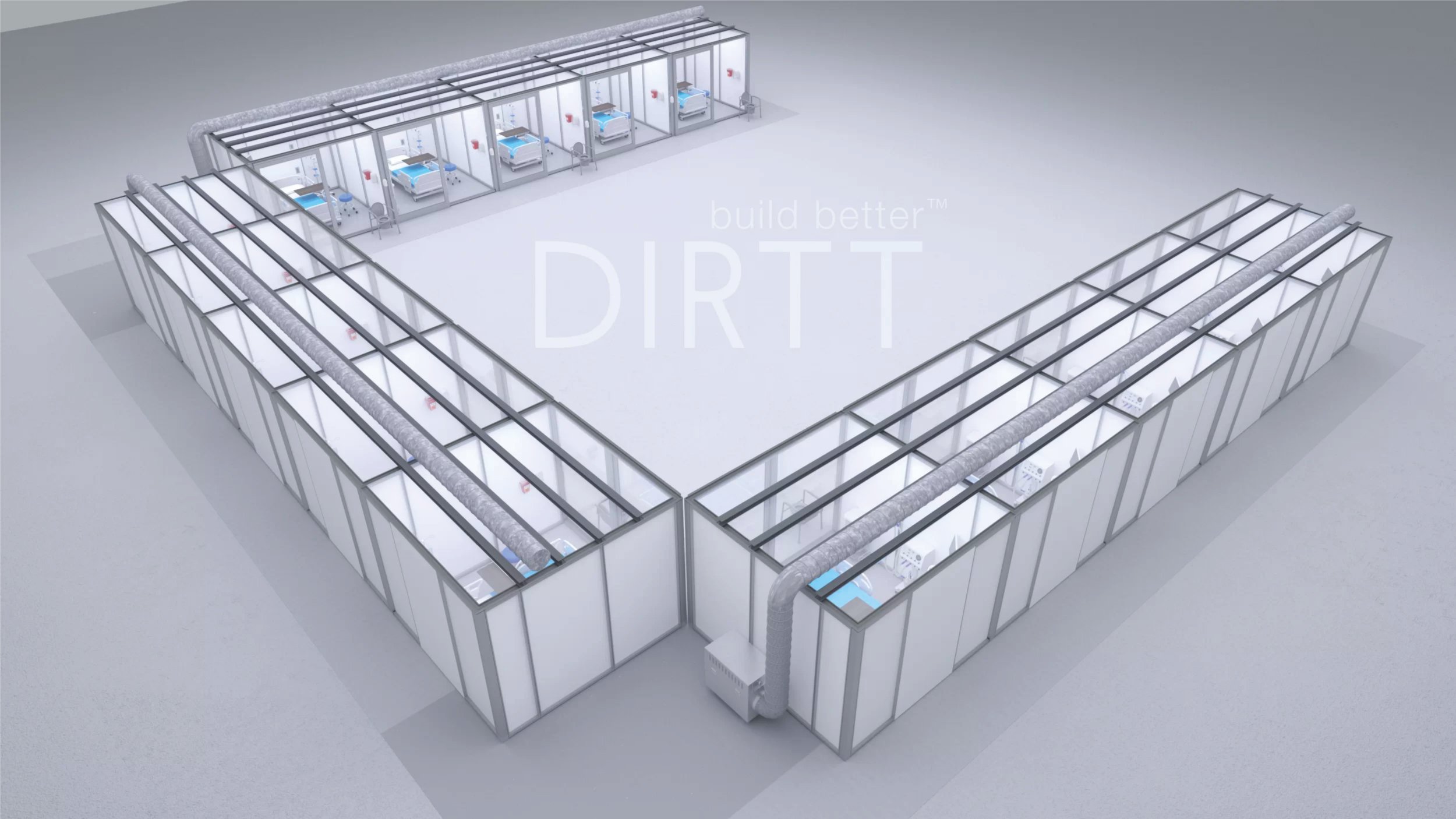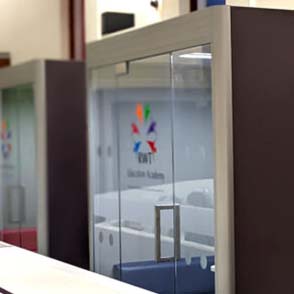Government responses to the covid-19 pandemic have in many cases been remarkable. They have needed to be given the depth of the shortage in healthcare facilities exposed by the rapid spread of the disease.
In the UK, the effective deployment of crisis plans, provision of large temporary hospitals and, most of all, the bravery and dedication of NHS workers and volunteers have all been truly admirable.
Yet it is abundantly clear that the world was unprepared for the scale of the challenge posed by the novel coronavirus SARS-CoV-2 and the effects on healthcare provision of covid-19, the potentially fatal disease that it causes.
Temporary hospitals
At the time of writing, the outbreak appears to be nearing its peak in a number of European countries, including Britain. That is not to say that there should be any relaxation in the sense of urgency about tackling the test that the virus sets for governments and healthcare providers.
As we move into phase two of the covid-19 event, we may need to relocate emergency healthcare facilities.
The enormous temporary hospitals at two UK exhibition centres, the NEC in Birmingham and Excel in London, will eventually be decommissioned. There are two reasons that should happen.

Temporary healthcare pods as isolation rooms
Firstly, there is the purely commercial explanation that the spaces will at some point have to be returned to their intended business and leisure purpose.
The second reason, which may mean decommissioning sooner rather than later, is that the temporary isolation rooms set up in these spaces are not purpose-designed healthcare structures but more akin to the partitioning systems used in exhibition halls to house individual companies’ exhibition stands. As a result, it may well be harder to maintain hospital standards of cleanliness for more than six months or so. Clearly, if so-called superbugs such as MRSA were to surface in these facilities, they would be a major threat to patients already fighting for their lives.
Modular healthcare facilities
That is by no means a criticism of these healthcare facilities.
Hindsight is a wonderful thing, and it would of course have been preferable if the UK authorities had purpose-designed temporary healthcare pods – adaptable, modular healthcare facilities – ready to erect when this crisis arrived. However, what has been done in London and Birmingham has been an effective response to a huge and urgent threat.
Optional Room configuration
As with any life-changing event, lessons will be learnt, and processes sharpened. We hope that, heaven forbid, there is another pandemic in future that healthcare providers worldwide will have equipped themselves with stockpiles of modular healthcare rooms.
Learn more about our temporary healthcare pods
Even if there is never another event like this one, there are still good reasons why providers are looking at investing in these facilities now. We’re pleased to have received enquiries from NHS England and NHS Trusts as well as private hospitals about our temporary modular room solutions.
Modular Healthcare Facilities: Investment Reason Number One
The first of those reasons is what we see as covid-19 phase two. While the number of coronavirus cases was ramping up, it made a lot of sense to move treatment away from regular hospitals as much as possible so that they could go on with providing their normal healthcare services and keep their non-covid-19 patients away from the virus. When the number of cases begins to fall, which standard epidemiology predicts will be at the same rate that they rose, we move into phase two when there is still a requirement for additional isolation rooms and associated hospital infrastructure.
Isolation room 5
On the face of it, investing in high-quality purpose-built modular healthcare systems to tackle covid-19 now might be regarded as shutting the stable door after the horse has bolted. The beauty of the DIRTT system available from Architectural Wallsz in the UK is that it can be reconfigured to meet changing healthcare needs, so today’s isolation pods become tomorrow’s consultation rooms, for example.
Modular Healthcare Facilities: Investment Reason Number Two
UK hospitals are no strangers to demand overwhelm. From the problems associated with misuse of A&E departments to the strain on services in bad winters, there is often a need for more facilities. What those facilities actually are at any one time will vary, as will the amount of capacity that is required.
Modular systems adapt to those changing needs, allowing for facilities to be repurposed, relocated or stored away until they are next needed.
Modular technology can be deployed to adapt existing healthcare interiors or to convert non-medical spaces for healthcare or, as mentioned above, to fit-out temporary structures such as mobile buildings.
Conversions
- Convert lower acuity units to high acuity units
- Repurpose administration spaces to triage or overflow areas
- Adapt cold shell spaces to isolation rooms, triage or overflow areas
Interior Construction
Turn new or existing temporary buildings into:
- Triage, treatment and administration spaces
- Drive-through testing and labs stations
- Isolation rooms
This is a prefabricated healthcare pod solution that can be deployed rapidly and at scale in the UK. Our advanced modular system is purpose-designed to convert existing hospital rooms and buildings as well as to create entirely new healthcare facilities in open spaces to meet emergency requirements. Crucially, our installations allow for the highest standards of infection control and cleanliness.
DIRTT emergency medical centre in converted shipping container
On the face of it, investing in high-quality purpose-built modular healthcare systems to tackle covid-19 now might be regarded as shutting the stable door after the horse has bolted. The beauty of the DIRTT system available from Architectural Wallsz in the UK is that it can be reconfigured to meet changing healthcare needs, so today’s isolation pods become tomorrow’s consultation rooms, for example.
Modular Healthcare Facilities: Investment Reason Number Two
UK hospitals are no strangers to demand overwhelm. From the problems associated with misuse of A&E departments to the strain on services in bad winters, there is often a need for more facilities. What those facilities actually are at any one time will vary, as will the amount of capacity that is required.
Modular systems adapt to those changing needs, allowing for facilities to be repurposed, relocated or stored away until they are next needed.
Modular technology can be deployed to adapt existing healthcare interiors or to convert non-medical spaces for healthcare or, as mentioned above, to fit-out temporary structures such as mobile buildings.
Conversions
- Convert lower acuity units to high acuity units
- Repurpose administration spaces to triage or overflow areas
- Adapt cold shell spaces to isolation rooms, triage or overflow areas
Interior Construction
Turn new or existing temporary buildings into:
- Triage, treatment and administration spaces
- Drive-through testing and labs stations
- Isolation rooms
This is a prefabricated healthcare pod solution that can be deployed rapidly and at scale in the UK. Our advanced modular system is purpose-designed to convert existing hospital rooms and buildings as well as to create entirely new healthcare facilities in open spaces to meet emergency requirements. Crucially, our installations allow for the highest standards of infection control and cleanliness.
Critical care room
Solutions range from a single acute medical care pod to large-scale healthcare and nursing pod installations.
We can manufacture, ship and install up to 500 healthcare rooms to any site in the UK within 30 days.
As well as providing acute care capacity, our healthcare pods can be designed for a variety of uses.
- Exam rooms
- Triage rooms
- Patient rooms
- Isolation rooms (positive and negative pressure)
- Diagnostic labs
- Administration spaces
- Drive-through testing and lab stations
We also provide headwall systems.
How It Works
Working with us, you can deliver care ahead of schedule, opening your doors weeks ahead of what would be possible with conventional construction. Manufactured off-site in days, we install on site in a fraction of the time that ordinary construction requires.
Up to 500 rooms can be delivered in the UK in a matter of days. As with all our installations, rooms are designed to your specification. You will also benefit from economies of scale as contracts are priced on a sliding scale per unit depending on quantity.
We design for better infection prevention and control by installing technology in the walls behind cleanable surfaces. We reduce touchpoints with our design elements, and our hospital-grade finishes help lower infection transfer. Meanwhile, our flexible hanging options move technology and accessories off the floor.
What’s included in our service
Wall frames in a range of finishes are installed above the floor. They can be freestanding, connect to the underside of a ceiling or support a ceiling.
- Minimum height 1.2M, maximum height 3M
- Infection-control gaskets
- 1.2M swing doors and ironmongery – 1.1M clear opening
- Factory installed utilities and/or rough-in for electric, network, low voltage, plumbing, medical gasses and other trades as required.
What’s not included
- Building or temporary structure, ceiling and floor
- MEP (mechanical and electrical,) utility engineering and infrastructure
- Connection of factory-installed components to building utilities


Modular temporary healthcare pods: Summary
Modular healthcare pods are a valuable investment for providers with long-term applications.
They are available to purchase or lease to provide isolation rooms during phase two of the covid-19 response. They can be repurposed or relocated for a variety of uses, from consultation rooms to admin. They can provide an instant response to seasonal demand for healthcare facilities. When not in use, they can be stored away (an astonishing 100 rooms will fit inside a single 40ft shipping container).
Finally, if the UK ever faces another healthcare crisis on the scale of covid-19, purpose-designed modular healthcare structures can be ready to be deployed to provide hospital care that meets the highest standards for as long as they are required.








Sorry, the comment form is closed at this time.